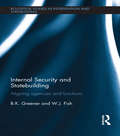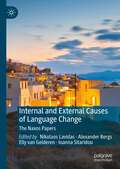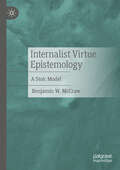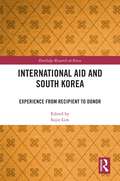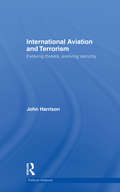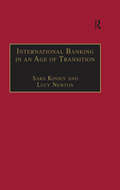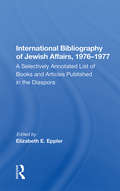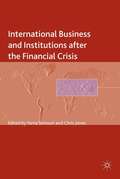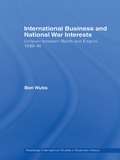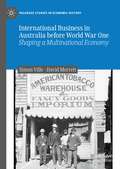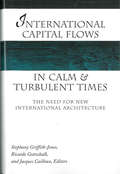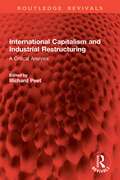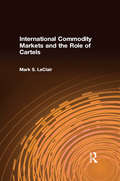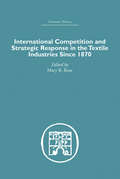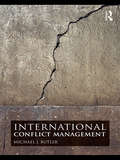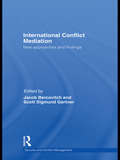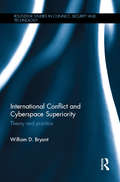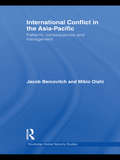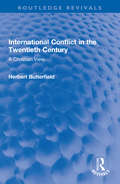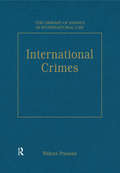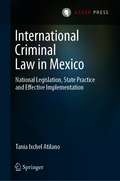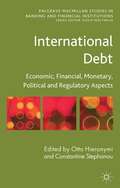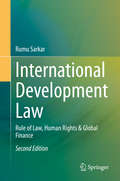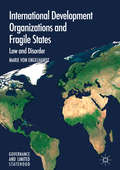- Table View
- List View
Internal Security and Statebuilding: Aligning Agencies and Functions (Routledge Studies in Intervention and Statebuilding)
by B. K. Greener W. J. FishThis book examines international efforts to provide security in post-conflict sites and explains why internal security should be given precedence in statebuilding endeavours. The work begins by exploring the evolution of security sectors in mature liberal democratic states, before examining the attempts of such states to accelerate that evolutionary process in post-conflict sites through statebuilding and security sector reform. These discussions suggest interestingly different answers to the question of who should provide for internal security in international operations. When considering mature states, there are both practical and normative reasons as to why internal security has become the sole domain of police, with military forces being excluded from internal affairs. In peace and stability operations, on the other hand, difficulties with utilising police personnel have led to military forces being required to play internal security roles. This tension is investigated further through detailed case studies of three recent missions: Afghanistan, Timor-Leste and Solomon Islands. These case studies both reinforce and augment the practical and normative reasons for ensuring that internal security remains the domain of police. This then impacts upon peace and stability operations in two important ways. If we are to provide enduring security in post-conflict sites, we should both (i) prioritise internal security agencies in security sector reform efforts, and (ii) prioritise ways of enabling police to play internal security roles in the contributing mission. This book will be of much interest to students of statebuilding, peace and conflict studies, military studies, police studies, historical sociology, security studies and IR in general.
Internal and External Causes of Language Change: The Naxos Papers
by Elly Van Gelderen Alexander Bergs Nikolaos Lavidas Ioanna SitaridouThis volume collects ten studies that propose modern methodologies of analyzing and explaining language change in the case of various morpho-phonological and morpho-syntactic characteristics. The studies were first presented in the fourth, fifth and sixth workshops at the “Language Variation and Change in Ancient and Medieval Europe” summer schools, organized on the island of Naxos, Cyclades, Greece and online between 2019 and 2021. The book is divided into two parts that both focus on modern tools and methodologies of analyzing and accounting for language change. The first part focuses on common directions of change in Indo-European languages and beyond, and the second part emphasizes explanations that reveal the role of language contact. The volume promotes a dialogue between approaches to language change having their starting point in structural and typological aspects of the history of languages on the one hand, and approaches concentrating on external factors on the other. Through this dialogue, the volume enriches knowledge on the contrast or complementarity of internally- and externally-motivated causes of language change.
Internalist Virtue Epistemology: A Stoic Model
by Benjamin W. McCrawThis monograph works at the intersection of two of the most popular and growing fields in epistemology: epistemic normativity or value and virtue epistemology. By challenging two hitherto un- or under-explored sets of assumptions—epistemological orthodoxies—operative in those fields and, by rejecting them, the book develops novel approaches to current theories of epistemic value and virtue. The book argues that what is needed is an internalist (i.e. non-externalist) mode of epistemic virtue. To accomplish this, it draws on Stoic moral theory, whereby the deployment of virtue—no matter whether one has any &‘external&’ success—suffices for completely successful action.
International Aid and South Korea: Experience from Recipient to Donor (Routledge Research on Korea)
by Sojin LimThis book explores South Korea’s experience as an aid recipient, as an aid donor, and as an inter‑Korea aid provider.Analysing case studies of international aid both received and dispensed by South Korea, from the end of the Korean War until the present day, this collection provides a novel lens through which to explore South Korea’s development pathway. While it examines the cases of Italian and German aid to South Korea during its early economic development period, this volume also delineates South Korea’s international aid in the health and gender sectors. It also discusses the South Korean experience of providing aid to the Mekong region and North Korea. The latter specifically analyses whether this policy represents international altruism or reveals a novel method of international validation for South Korea over its neighbour.Featuring an exploration of South Korea’s development on the international stage through the lens of aid, this book will appeal to both students and scholars in the fields of Korean studies, East Asian studies, and Asia Pacific studies, as well as in the disciplines of Development Studies and International Relations and Political Economy, particularly that of aid policies and practices.
International Aviation and Terrorism: Evolving Threats, Evolving Security (Political Violence)
by John HarrisonThis book examines terrorism's impact on the international aviation security regime, with a focus on the role of the United States. Tracing the historical development of the international civil aviation system, the volume examines how it has dealt with the evolving security environment caused by international terrorism. It begins by exploring the practical implications of the debates over the meaning of 'terrorism' and how the international civil aviation community developed practical solutions to avoid the debilitating debates over the concept while crafting important, if weak, international conventions. As a major civil aviation power, the United States was a predominant influence in security developments in the 1960s and 1970s, yet US civil aviation policy failed to keep pace with the changing nature of the terrorist threat. The commanding position that the United States maintains in international civil aviation provides a microcosm of the promise and perils faced by the world's sole superpower. The author examines US efforts to upgrade civil aviation security in the wake of 9/11 and the impacts of these developments on the international civil aviation system. The detailed discussion of terrorism past and present places the threat in its proper context for both the international civil aviation community and its largest individual actor, the United States. This book will be of much interest to students of terrorism, aviation security, international security and IR in general. John Harrison is an Assistant Professor at the S.Rajaratnam School of International Studies and Head of Terrorism Research at the International Center for Political Violence and Terrorism Research.
International Banking in an Age of Transition: Globalisation, Automation, Banks and Their Archives (Studies in Banking and Financial History)
by Sara Kinsey Lucy NewtonSweeping changes have taken place in the financial sector during the twentieth century. Two of the most notable changes have been the growth of global markets and institutions, and the introduction of computerisation. This volume charts the course of concentration and internationalisation in banking and also examines the influence and implications of new technologies on the industry’s record-keeping practices. The exploration of concentration and internationalisation begins in the late nineteenth century and examines the effect of a wide range of factors, from macro-economic influences such as the liquidity crisis of the 1930s and the oil price rises of the 1970s, to the role of national regulation in the creation of financial markets and innovative products. The role of individual banks and their particular policies is also brought into focus. Some of Europe’s most eminent bankers provide a contemporary dimension by discussing possible future developments in continental banking.
International Bibliography Of Jewish Affairs, 1976-1977: A Selectively Annotated List Of Books And Articles Published In The Diaspora
by Elizabeth E. EpplerThis bibliography, a project of is intended as an aid to research on and cultural aspects of contemporary ship between Jews and the non-Jewish material published in 1976 and 1977. the Institute of Jewish Affairs, the historical, social, political, Jewish life and on the relationworld. The present volume covers The Bibliography includes primarily nonfiction works published outside Israel by both Jewish and non-Jewish authors; it excludes belles lettres (with the exception of documentary novels and memoirs) and religious studies. Entries are arranged by subject, with cross-references wherever applicable; a cumulative index of names and a list of periodicals are provided at the end of the volume.
International Business and Institutions after the Financial Crisis
by Chris Jones Yama TemouriThe challenge in the post crisis world is how business, government and academia come together to foster conditions for sustainable economic development. Understanding this requires an examination of the fundamental principles of IB, including location decisions, returns to multinationality and links between government and business, and CSR.
International Business and National War Interests: Unilever between Reich and empire, 1939-45 (Routledge International Studies In Business History Ser.)
by Ben WubsThis book deals with the activities of the Anglo-Dutch multinational during the war. Given the various threats faced by Unilever during the Nazi period, Ben Wubs argues that it was not self evident that the company would survive the war. Based on research into company sources which were hitherto unavailable, he shows the effect of the war on Unilev
International Business in Australia before World War One: Shaping a Multinational Economy (Palgrave Studies in Economic History)
by Simon Ville David MerrettThis book challenges conventional wisdom by revealing an extensive and heterogeneous community of foreign businesses in Australia before 1914. Multinational enterprise arrived predominantly from Britain, but other sender nations included the USA, France, Germany, New Zealand, and Japan. Their firms spread out across Australia from mining and pastoral communities, to portside industries and CBD precincts, and they operated broadly across mining, trading, shipping, insurance, finance, and manufacturing. They were a remarkably diverse population of firms by size, organisational form, and longevity.This is a rare study of the impact of multinationals on a host nation, particularly before World War One, and that focuses on a successful resource-based economy. Deploying a database of more than 600 firms, supported by contemporary archives and publications, the work reveals how multinational influence was contested by domestic enterprise, other foreign firms, and the strategic investments of governments in network industries. Nonetheless, foreign agency – particularly investment, knowledge and entrepreneurship – mattered in the economic development of Australia in the nineteenth as well as the twentieth centuries. This book will be of interest to students and researchers in Australian and international economic and business history, the history of economic growth and scholars of international business.
International Capital Flows in Calm and Turbulent Times
by Stephany Griffith-Jones Ricardo Gottschalk Jacques CaillouxInternational Capital Flows in Calm and Turbulent Times analyzes the financial crises of the late 1990s and draws attention to the type of lenders and investors that triggered and deepened the crises. It concentrates on institutional investors and banks and provides detailed analysis of the countries most affected by the 1997-98 Asian financial crisis as well as the Czech Republic and Brazil. It also suggests necessary international financial reforms to make crises less likely. The book is unique in its scrutiny of the type of lenders and investors that triggered and deepened the crises, focusing particularly on institutional investors and banks; allocation of their assets; the criteria used in this process; and the impact of the nature of the investor on the volatility of different types of capital flow. It addresses such questions as: What determines or triggers massive changes in perceptions and sentiment by different investors and leaders? To what extent does contagion spread not just among countries but between actors? What are the policy implications of this analysis? The book concludes by examining the asymmetries in the financial architecture discussions and implementation and by offering policy proposals.
International Capitalism and Industrial Restructuring: A Critical Analysis (Routledge Revivals)
by Richard PeetFirst published in 1987, International Capitalism and Industrial Restructuring counters the idea that industrial restructuring is a relatively problem-free stage in the evolution to a post-industrial society. The editor argues that the permanent loss of eight million manufacturing jobs in the advanced industrial countries over the past ten years has had extremely serious effects on people, economies, and societies, and that it is a major cause of economic recession. The six million jobs gained in the newly industrializing countries pay low wages, expose workers to hazards, destroy local cultures, and fail in generating integrated development for the Third World.Many outstanding articles are included, drawn from a wide variety of radical journals, with introductions that set the scene and pose challenging questions. All students and researchers concerned with industrial restructuring in the capitalist world will find the book valuable as a radical critique of widespread current economic problems.
International Commodity Markets and the Role of Cartels (Issues In Work And Human Resources Ser.)
by Mark S. LeClairThe phenomenon of collusive international agreements (cartels) became widespread in the 1930s. At that time, attempts to control production and prices were mainly the prerogative of multinational firms operating in the developing (then colonized) world. The "modern era" of cartels began in the 1960s, when the governments of developing nations began to participate in commodity agreements to achieve increases and stability in the world price of their commodities. This book is principally concerned with the modern era of cartels. It goes beyond the singular example of petroleum and OPEC to examine the structure of international commodity markets for bauxite (aluminum ore), cocoa, coffee, rubber, sugar, and tin, and the conditions that led to the formation of cartels in those markets during the latter half of the twentieth century. Specifically, the work focuses on four major aspects of international commodity markets: patterns of production and consumption; economic dislocations to both importers and exporters due to price fluctuations; the formation of cartels as a solution to weak and variable commodity prices; and the likely effects arising from tightening raw material markets. The book concludes with a detailed examination of what the future holds for each of the cartels, and what role technology, 24-hour market trading, and decreasing foreign direct investment in producing countries will have on the management of commodity markets.
International Communism and the Spanish Civil War
by Lisa A. KirschenbaumInternational Communism and the Spanish Civil War provides an intimate picture of international communism in the Stalin era. Exploring the transnational exchanges that occurred in Soviet-structured spaces - from clandestine schools for training international revolutionaries in Moscow to the International Brigades in Spain - the book uncovers complex webs of interaction, at once personal and political, that linked international communists to one another and the Soviet Union. The Spanish Civil War, which coincided with the great purges in the Soviet Union, stands at the center of this grassroots history. For many international communists, the war came to define both their life histories and political commitments. In telling their individual stories, the book calls attention to a central paradox of Stalinism - the simultaneous celebration and suspicion of transnational interactions - and illuminates the appeal of a cause that promised solidarity even as it practiced terror.
International Competition and Strategic Response in the Textile Industries SInce 1870
by Mary B. RoseThis book of essays, which draws on the expertise of leading textile scholars in Britain and the United States, focuses on the problem of and responses to foreign competition in textiles from the late nineteenth century to the present day. A short introductory essay by the editor is followed by a survey of the debates surrounding the British cotton industry, foreign competition and competitive advantage. The other essays consider various aspects of that competition, including textile machine-making, Lancashire perceptions of the rise of Japan during the inter-war period and responses to foreign competition in the British cotton industry since 1945, whilst others deal with the decline and rise of merchanting in UK textiles and European competition in woollen yarn and cloth from 1870 to 1914. A recurring theme in a number of the essays is Japanese competitive advantage in textiles. The book is unique since although there are numerous books dealing with the problems of British staple industries, none focuses primarily on the issue of competition, its sources and responses, nor on textiles in general rather than a single industry. Moreover, since the scope is international rather than limited only to the UK, it follows recent trends in British busines history away from single company case studies towards a more thematic, comparative approach. In addition, the international authorship of these papers gives this book, first published in 1991, wide appeal.
International Conflict Management
by Michael J. ButlerThis new textbook provides students with an accessible overview of the logic, evolution, application and outcomes of the five major approaches of the growing field of international conflict management: traditional peacekeeping peace enforcement and support operations negotiation and bargaining mediation adjudication. The book aims to provide the student with a fuller understanding of the strengths and weaknesses of these five techniques within the dynamic context of the contemporary security environment, especially in relation to recent and ongoing case studies of inter-state and intra-state conflict. To demonstrate the changing nature of security in the post-Cold War world, the text contrasts this with competing visions of security during the Cold War and earlier periods, and provides numerous points of comparison with the dominant causes, types, strategy, and prosecution of warfare in other eras. International Conflict Management will be essential reading for all students of conflict management, mediation, peacekeeping, peace and conflict studies, and international security in general. Michael J. Butler is an Assistant Professor in the Department of Government and International Relations at Clark University (USA).
International Conflict Mediation: New Approaches and Findings (Routledge Studies in Security and Conflict Management)
by Jacob Bercovitch Scott Sigmund GartnerThis book examines how new empirical approaches to mediation can shed fresh light on the effectiveness of different patterns of conflict management, and offers guidelines on the process of international mediation. International conflict mediation has become one of, if not the most prominent and important conflict resolution methods of the early 21st century. This book argues that traditional approaches to mediation have been inadequate, and that in order to really understand how the process of international mediation works, studies need to operate within an explicit theoretical framework, adopt systematic empirical approaches and use a diversity of methods to identify critical interactions, contexts and relationships. This volume captures recent important changes in the field of international conflict mediation, and includes essays by leading scholars on a variety of critical aspects of conflict management, using state of the art analytical tools and up to date data. This book will of great interest to scholars of peace and conflict studies, methods in social science, and of International Relations in general.
International Conflict and Cyberspace Superiority: Theory and Practice (Routledge Studies in Conflict, Security and Technology)
by William D. BryantThis book examines cyberspace superiority in nation-state conflict from both a theoretical and a practical perspective. This volume analyses superiority concepts from the domains of land, maritime, and air to build a model that can be applied to cyberspace. Eight different cyberspace conflicts between nation states are examined and the resulting analysis is combined with theoretical concepts to present the reader with a conclusion. Case studies include the conflict between Russia and Estonia (2007), North Korea and the US and South Korea (2009) and Saudi Arabia and Iran in the Aramco attack (2012). The book uses these case studies to examine cyberspace superiority as an analytical framework to understand conflict in this domain between nation-states. Furthermore, the book makes the important distinction between local and universal domain superiority, and presents a unique model to relate this superiority in all domains, as well as a more detailed model of local superiority in cyberspace. Through examining the eight case studies, the book develops a rigorous system to measure the amount of cyberspace superiority achieved by a combatant in a conflict, and seeks to reveal if cyberspace superiority proves to be a significant advantage for military operations at the tactical, operational, and strategic levels. This book will be of much interest to students of cyber-conflict, strategic studies, national security, foreign policy and IR in general.
International Conflict in the Asia-Pacific: Patterns, Consequences and Management (Routledge Global Security Studies)
by Jacob Bercovitch Mikio OishiThis book analyses four major long-standing and intractable conflicts in the Asia-Pacific region (the Korean Peninsula; the Taiwan Strait; the South China Sea (Spratly Islands); and India-Pakistan), and aims to identify the mechanisms used to manage these conflicts. International Conflict in the Asia-Pacific brings together in one volume four major international conflicts that have shaped the region, and studies how they evolved and how best to manage them. The book seeks to find a pattern common to the four conflicts and their management as well as taking note of variations among them, hereby aiming to establish what might be called the 'Asia-Pacific way of managing intractable conflicts'. This book will of much interest to students of international conflict management, Asian politics, security studies and IR in general. Jacob Bercovitch is Professor of International Relations in the Political Science Department at the University of Canterbury in New Zealand. Widely regarded as one of the most influential scholars in the field of international conflict resolution, he is author of more than 15 books and numerous articles. Mikio Oishi is a Visiting Fellow with the National Centre for Peace and Conflict Studies (NCPACS), University of Otago and a Research Fellow with Political Science Programme of University of Canterbury.
International Conflict in the Twentieth Century: A Christian View (Routledge Revivals)
by Herbert ButterfieldFirst published in 1960, International Conflict in the Twentieth Century considers how to solve the problem of human relations for external affairs. Stepping back from the more common focus on "current affairs", the book explores in detail the processes and patterns of history, the principles that underlie foreign policy, the ethical issues involved in international affairs, and the role of Christianity in a time of global revolution. In doing so, it covers a variety of topics including morality, scientific approaches to politics, lessons from history, and human nature. International Conflict in the Twentieth Century will appeal to those with an interest in religion and politics, religious philosophy, and religious and political history.
International Crimes
by Gaurav SharmaThis volume makes accessible a selection of the most significant journal articles dealing with international crimes. The studies collected here will be an invaluable aid to teaching and research.
International Criminal Law in Mexico: National Legislation, State Practice and Effective Implementation
by Tania Ixchel AtilanoThis book puts forward proposals for solutions to the current gaps between the Mexican legal order and the norms and principles of international criminal law. Adequate legislative measures are suggested for compliance with international obligations. The author approaches the book's subject matter by tracing all norms related to the prosecution of core crimes and contextualizing each of the findings with a brief historical and political account. Additionally, state practice is analyzed, identifying patterns and inconsistencies. This approach is new in offering a wide perspective on international criminal law in Mexico. Relevant legal documents are analyzed and annexed in the book, providing the reader with a useful guide to the topics analyzed. Issues including the following are examined: the incorporation of core crimes in the Mexican legal order, military jurisdiction, the war crimes definition under Mexican law, unaddressed atrocities, state practice and future challenges to combat impunity. The book will be of relevance to legal scholars, students, practitioners of law and human rights advocates. It also offers interesting insights to political scientists, historians and journalists. Tania Ixchel Atilano has a Dr. Iur. from the Humboldt Universität Berlin, an LLM in German Law from the Ludwig Maximilian Universität, Munich, and attained her law degree at the ITAM in Mexico City.
International Debt
by Otto Hieronymi Constantine A. StephanouWritten by a group of international experts, this book focuses on three interdependent themes: (a) origins and consequences of the current debt crisis; (b) the systemic nature of the crisis; (c) national and international policy efforts to avoid a global collapse and bring about lasting reforms in the Euro zone and in the financial system.
International Development Law: Rule of Law, Human Rights & Global Finance (International Economic Development Law Ser. #Vol. 14)
by Rumu SarkarThis book describes how international development works, its shortcomings, its theoretical and practical foundations, along with prescriptions for the future. International Development Law provides the reader with new perspectives on the origins of global poverty, identifies legal impediments to sustainable economic growth, and provides a better understanding of the challenges faced by the international community in resolving global poverty issues. The text is structured into two basic parts: the first part deals with the theoretical and philosophic foundations of the subject, and the second part sets forth issues relating to the international financial architecture, namely, international borrowing practices, privatization, and emerging economies. In particular, the book provides new, innovative analysis on corruption as an impediment to sustainable development. The three interlocking facets of corruption are examined: transnational organized crime, Islamic-based international terrorism, and corruption within emerging economies and the international banking system. Thus fresh new analysis adds depth and clarity to a field that heretofore has been scattered and superficial. Finally, the “right to development” within the international human rights discourse is critically reviewed, particularly in light of new jurisprudence emerging from the African context.This book offers a fresh, new and balanced legal perspective on the development process. The text has been rigorously researched and has many practical facets based on the author’s professional experience within the international development field. It is an invaluable research and teaching tool since it takes a multidisciplinary approach to putting complex issues, legal trends and political questions into a clear, new perspective that is highly analytical as well as accessible to the reader. The author's elegant legal prose is both powerful and persuasive.
International Development Organizations and Fragile States
by Marie Von EngelhardtThis book addresses a conundrum for the international development community: The law of development cooperation poses major constraints on delivering aid where it is needed most. The existence of a state with an effective government is a basic condition for the transfer of aid, making development cooperation with 'fragile' nations particularly challenging. The author explores how international organizations like the World Bank have responded by adopting formal and informal rules to engage specifically with countries with weak or no governments. Von Engelhardt provides a critical analysis of the discourse on fragile states and how it has shaped the policy decision-making of international organizations. By demonstrating how perceptions of fragility can have significant consequences both in practice and in law, the work challenges conventional research that dismisses state fragility as a phenomenon beyond law. It also argues that the legal parameters for effective global policy play a crucial role, and offers a fresh approach to a topic that is central to international security and development.
